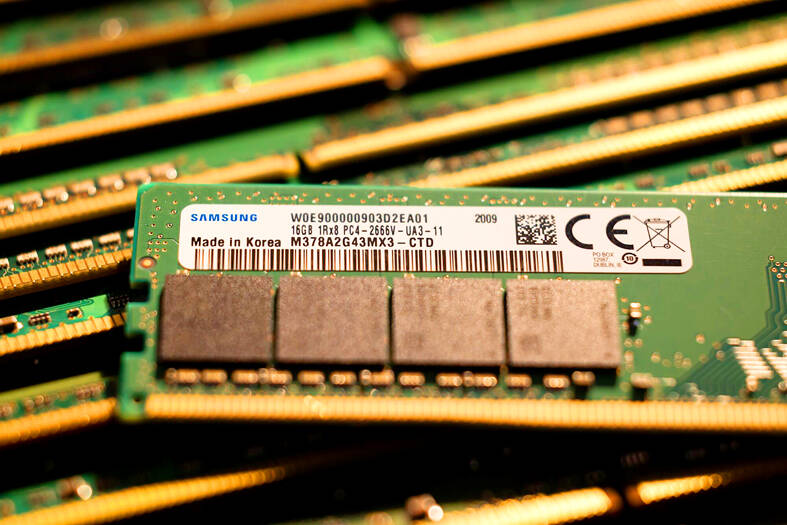South Korea’s semiconductor industry has recorded the largest gains in years in production and shipments, underscoring a revival of technology momentum that bodes well for the nation’s economic outlook next year and the global technology sector.
Chip production jumped 42 percent last month from a year earlier, the most since early 2017, while shipments soared 80 percent, the biggest annual gain since late 2002, data released yesterday by Statistics Korea showed.
Inventories expanded by 36 percent in the smallest rise since February.

Photographer: SeongJoon Cho/Bloomberg
The numbers suggest that South Korea’s most important industry is roaring back from a slump that weighed on the economy for more than a year and adds to optimistic signals for chipmakers such as Samsung Electronics Co and SK Hynix Inc.
The figures also suggest that a nascent recovery in global technology sector demand might be gaining momentum.
South Korea’s trade-reliant economy has muddled through this year with suppressed demand for semiconductors and is forecast by the central bank to have expanded 1.4 percent, less than 2.6 percent last year, under higher interest rates, an economic slowdown in China and geopolitical risks.
The latest chip data suggest the nation’s technology manufacturers might help support growth. The strength of semiconductor makers drove a better-than-expected 5.3 percent expansion in the nation’s industrial output from a year earlier last month, suggesting that the economy is gathering steam in the fourth quarter.
Demand for high-performance semiconductors has in particular helped the chip and machinery industries, the South Korean Ministry of Finance said in a statement.
The Bank of Korea sees the economy expanding by 2.2 percent next year on the back of exports gaining further strength after they returned to growth in October.
Memorychip prices are starting to bounce back while emerging technologies such as artificial intelligence add to demand.

When an apartment comes up for rent in Germany’s big cities, hundreds of prospective tenants often queue down the street to view it, but the acute shortage of affordable housing is getting scant attention ahead of today’s snap general election. “Housing is one of the main problems for people, but nobody talks about it, nobody takes it seriously,” said Andreas Ibel, president of Build Europe, an association representing housing developers. Migration and the sluggish economy top the list of voters’ concerns, but analysts say housing policy fails to break through as returns on investment take time to register, making the

‘SILVER LINING’: Although the news caused TSMC to fall on the local market, an analyst said that as tariffs are not set to go into effect until April, there is still time for negotiations US President Donald Trump on Tuesday said that he would likely impose tariffs on semiconductor, automobile and pharmaceutical imports of about 25 percent, with an announcement coming as soon as April 2 in a move that would represent a dramatic widening of the US leader’s trade war. “I probably will tell you that on April 2, but it’ll be in the neighborhood of 25 percent,” Trump told reporters at his Mar-a-Lago club when asked about his plan for auto tariffs. Asked about similar levies on pharmaceutical drugs and semiconductors, the president said that “it’ll be 25 percent and higher, and it’ll

CHIP BOOM: Revenue for the semiconductor industry is set to reach US$1 trillion by 2032, opening up opportunities for the chip pacakging and testing company, it said ASE Technology Holding Co (日月光投控), the world’s largest provider of outsourced semiconductor assembly and test (OSAT) services, yesterday launched a new advanced manufacturing facility in Penang, Malaysia, aiming to meet growing demand for emerging technologies such as generative artificial intelligence (AI) applications. The US$300 million facility is a critical step in expanding ASE’s global footprint, offering an alternative for customers from the US, Europe, Japan, South Korea and China to assemble and test chips outside of Taiwan amid efforts to diversify supply chains. The plant, the company’s fifth in Malaysia, is part of a strategic expansion plan that would more than triple

Taiwanese artificial intelligence (AI) server makers are expected to make major investments in Texas in May after US President Donald Trump’s first 100 days in office and amid his rising tariff threats, Taiwan Electrical and Electronic Manufacturers’ Association (TEEMA, 台灣電子電機公會) chairman Richard Lee (李詩欽) said yesterday. The association led a delegation of seven AI server manufacturers to Washington, as well as the US states of California, Texas and New Mexico, to discuss land and tax issues, as Taiwanese firms speed up their production plans in the US with many of them seeing Texas as their top option for investment, Lee said. The